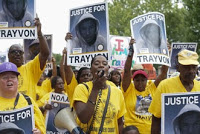This desire for escape, vindication and the intervention of God is also central to modern Christian theology. Most of the churches that I know adhere to some form of the Apostles’ Creed which offers the claim that Jesus will someday “come again to judge the living and the dead.” A common belief spans across denominational identities and philosophical leanings that at some point, “God’s people” will be removed (or “raptured”) from their existence in the world so that God can judge and ultimately deal with “wicked” people, and that at that time, those who have suffered oppression and/or persecution will finally witness God’s justice. This time of intervention– the “end times,” if you will– is understood as the time in history when God will finally balance the scales… a time for which many Christians wait with anticipation.
In that moment, I understood the desire to escape, but reminded myself of my responsibility to remain as present as possible. I understood the desire for God’s intervention, but also understood that it is my responsibility to intervene constructively. I reminded myself that the intervention of God requires the cooperation of humans… I remembered that the tools for changing the world have been entrusted to me. I fought the urge to escape our society and the urge to wait patiently for divine intervention.
 Earle Fisher took another route. He grounded his reflection in a critique of the “too-little-too-late responses from ministerial leaders.”
Earle Fisher took another route. He grounded his reflection in a critique of the “too-little-too-late responses from ministerial leaders.” In all honesty, I must say that I’m not necessarily “moved” by the Monday morning quarterbacks for social justice who swim to the surface at every sign of social acceptance. We need our ministerial communities to have a revolution of values. It’s repugnant how much blood is on the contemporary Church’s hands. We’ve sat idly by while injustice has been gaining traction and recovering ground lost during the Civil Rights Movement (and other progressive efforts for equality, justice and peace). We’ve perpetuated our own evil as we were singing radically individualistic and hedonistic renditions of “Bless ME Indeed” and “Enlarge MY Territory” and “Go Get YOUR Blessing”. By the way, how’s that “walking into MY season” thing working out for us right now?
The harsh truth is that this verdict (and the countless number of similar instances akin to it all over the country) are merely reminders that the Church and its constituents are in denial that our work is a constant struggle and not a fly-by-public-tragedy, opportunistic and momentary instance. Social Justice is a MOVEMENT not a moment we use for photo-ops and pamphlet productions. I recommend that anyone who’s ministe
r merely suggested that we “fast and pray” in response to this verdict, needs to “pack up and leave” and find a better church and a more engaged minister.
Words escape my very sense of being civil. Civility awakes to embedded anger that is ready to engage any and all who make comical commentary about the death of Trayvon Martin. For me this extends past Trayvon’s death into my own personal world and the world of many fathers with teenage sons. The reality is that this is and could have been the very same verdict that can so easily have befalling my 17 year son.
Foulks ends his reflection in the hope that something could come from this tragedy.
My hope is that the kid that donned the hoodie, Trayvon Benjamin Martin, when he went to the store will be a symbol of change for young boys. The tragedy that happened to Trayvon happens weekly around the country but this time it was highlighted. We stand once again asking, “Is there value for the young black male.” I answer unequivocally, Yes.
The name of Trayvon Martin becomes the latest one etched upon a monument of Black lives ended because they were perceived as dangerous….There are countless Black men, women and children who were removed from this earth because of the fear of and de-valuation of Black bodies. Black lives ended because of the need to control, regulate and act upon Black bodies. Black lives ended because of the erroneous perception that the actions of a Black person are indicative of the behavior of all Black persons. This is not the first time we’ve encountered the trope of the angry, bestial, menacing Black man. It’s been used to feed fantasies, reinforce sexual stereotypes, sway voters, sway potential jurors, and sway public opinion.
The shooting of Trayvon Martin caused many a parent of color to once again have “the talk” with their children. That talk, the talk when Black parents have to interrupt their children’s innocence with cold hard facts about what little value some people will place on their lives. When you are a Black teenager, learning to drive takes on an entirely new context.
ience while at the same time not afraid to wrestle with the question or stay in the tension of stuff that does not make any sense. Is reflective type of theology does not pretend to have all the answers—matter of fact, it sometimes celebrates not having any answers at all, but invites all to come and reason together. It is out of this reasoning that a hopeful outcome comes, where we all listen, discern what the spirit is saying, and then as Crystal Lewis reminds us, “pray for clarity on what I might do to help change the world.”



















